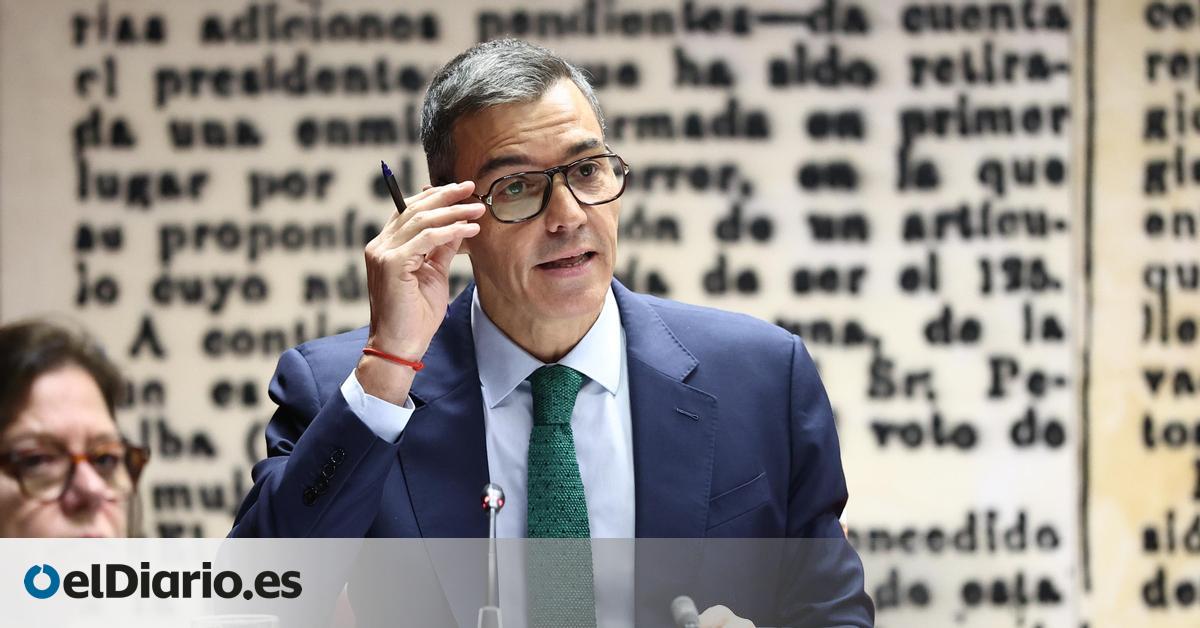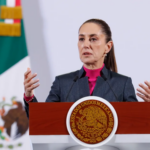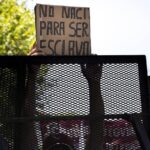
Pedro Sánchez came away “very satisfied” from his appearance at the Senate investigative committee, where the PP summoned him, just the day after the first anniversary of the dana. It was the bullet that Alberto Núñez Feijóo had in store and the right has, as expected, muddied the session without managing to put the president in great trouble. Sánchez has spoken of a “defamation commission” and has described it as a “circus”, much to the anger of the PP, Vox and UPN senators. The president has assured that the financing of the PSOE is “absolutely clean” and has contrasted it with that of the PP. He has also taken the opportunity to remind conservatives of the commission that Isabel Díaz Ayuso’s brother received for the sale of masks in the middle of the pandemic.
The appearance has been divided into three phases: a start with noise and interruptions led by UPN and Vox, a couple of hours of interrogation by the groups that support the government, who, except in the case of the PSOE, have also questioned the president on sensitive issues, such as his relationship with José Luis Ábalos, Leire Díez or Víctor Aldama; and the culmination with a ‘face to face’ with the PP spokesperson, Alejo Miranda de Larra, who practically did not allow the president to answer and who has even gone so far as to say that he was giving up questions that he had previously asked. “I am not obliged by the Penal Code. Based on how this commission has gone, I am delighted,” Sánchez told the PP spokesperson at one point.
The main interest of the right-wing interrogators was to know if Sánchez received cash from the PSOE, a practice that is legal. “I have always been able to settle expenses against invoices,” the president has admitted again, who has ruled out that they exceeded 1,000 euros, which is the limit of the anti-money laundering law. Sánchez has subsequently specified that it has occurred in an “anecdotal and punctual” manner, but has reiterated that it is a legal practice. “It seems incredible that they confuse cash payment with black money,” he reproached the conservatives.
Virtually all of the participants have asked about their relationship with José Luis Ábalos, Koldo García and Santos Cerdán, a group that the Navarrese has described as “the Peugeot gang”, in reference to the support they gave her in the 2017 primaries. Sánchez wanted to be ironic in his answers to make it clear that he considers the investigation commission a “circus”. “Thousands of colleagues accompanied me. The car doesn’t fit all of them,” he joked in his response to the UPN senator: “Are you asking me how many were in the Peugeot? Really, your honor? Are we going to spend all morning talking about who was in the Peugeot? Well, your honor, it depends on the day.”
From there, Sánchez has responded seriously to ensure that he has assumed responsibility for the corruption cases that affect Ábalos, Cerdán and García. “As president and general secretary of the PSOE, I acted at the time of Koldo García’s arrest. It was when I asked Ábalos for the deputy’s certificate,” replied the president, who assured that he had “political trust” in Ábalos, who he said was an “eloquent” and “politically solid” person, although he admitted that his conduct was “improper” and recalled that the PSOE has changed its rules to make militancy incompatible. with “prostitution consumption”.
“I was not aware of these practices”
“It had nothing to do with his circumstances, habits and daily life that I was unaware of,” he stated. “One thing is the political trust that I placed in Ábalos and another thing quite different is the daily behavior of Ábalos personally that I reject and disappoints me,” he concluded. Sánchez has insisted, in any case, that the departure of the Minister of Transport from the Council of Ministers, which also coincided with that of the Organization Secretariat in 2021, had to do with the need to give a “political impetus” after the pandemic.
Sánchez has insisted that he was not aware of the alleged criminal actions of Ábalos, García and Cerdán before the judicial investigations began. “Did they have prior knowledge of the events or did they act when they were made public?” asked the Bildu senator: “As far as I know, I had no knowledge of these practices.” However, he has left in the air the question that the PP has asked him about whether the then manager, Mariano Moreno, warned him about the then minister’s expenses. “Not that I remember,” he responded.
The president has denied having a relationship with the businessman Víctor de Aldama, investigated in the hydrocarbons plot who claims to have paid commissions to the socialists, despite the insistence of several senators, including that of the PP, who have even asked him if he would submit to a “voluntary confrontation” with Koldo and Aldama. “That Mr. Aldama is your guide shows desperation,” he said.
Sánchez avoids talking about his brother
Regarding Leire Díez, the one known as the PSOE’s ‘plumber’, she said she was not aware that she followed Ferraz’s instructions. “For the record, no,” he responded, before remembering that they put the flash drive with the information that Díez provided “in the hands of the Prosecutor’s Office”: “It is sub judice and we will see how far it goes.” Regarding the statements of the businesswoman Carmen Pano, a businesswoman accused in the hydrocarbons case, who assured that she took 90,000 euros to Ferraz, she stated: “Whatever a person who is being investigated for such serious crimes may say, she will allow me not to comment, I do not give her the slightest credibility.” Sánchez has reproached the right for basing themselves on what “digital tabloids” publish.
Despite the corruption that affects its hard core in the PSOE, Sánchez has assured that his Government “together with that of Zapatero is one of the cleanest governments in the history of Spanish democracy.” “Mr. Aznar has 34 cases investigated, more than 1,000 million stolen. Rajoy, 62 cases of alleged corruption and more than 1,200 charges investigated,” he said later.
Beyond these statements, the right-wing interrogators have not been able to extract much information from Sánchez, largely because they themselves interrupted him and allowed him to leave the questions unanswered. For example, far-right senator Ángel Gordillo has asked about the rescue of Air Europa and whether Begoña Gómez had anything to do with it or whether she charged commissions. But he got involved in his own comments when Sánchez answered about the “assumption of responsibilities” and ended up not answering the questions of the Vox parliamentarian, who showed a certain desperation to the point that he acknowledged that he expected “little” from the appearance. Something similar has happened to the PP spokesperson.
By then, when asked by groups that support the Government, the president had already referred to this matter to ensure that his wife had “nothing to do” with that operation and has defended the emergency mechanism that was put in place to rescue companies during the pandemic. In fact, he recalled that European justice has endorsed the decision by rejecting an appeal from Ryanair. He has also read the UCO report that disassociates Begoña Gómez from that decision while the PP has suggested that it had something to do with it.
What Sánchez has achieved is not to answer any questions about the case of his brother, who is awaiting trial for the hiring by the Badajoz Provincial Council at the city conservatory. The PP senator asked him if David Sánchez lived in Elvas. “What does it have to do with the purpose of this commission?” he asked the president of the commission, who agreed with Sánchez not to answer.
The Vox senator has also asked him if his father-in-law, whom he has called “the lord of the prostitution businesses”, financed the primary campaign. “I leave aside all the qualifiers he makes about my deceased father-in-law. Of course not,” responded the president, who later defended the cleanliness of that process. “I have no information about whether my father-in-law, may he rest in peace, could donate as an individual,” he later responded to questions from the PP. In fact, he has used the “I don’t know” formula for all questions of this type, which have included donors such as businessmen who later obtained public contracts or “Venezuelan money.”
And the PP has taken out the wild card of Venezuela in the interrogation following the trip of the vice president, Delcy Rodríguez, who was received in Barajas by Ábalos, accompanied by Koldo and Aldama. “That entry and stepping on European soil is prevented,” Sánchez defended. “Is Venezuela a dictatorship?” Miranda asked him. “Were suitcases unloaded?” he asked, to which Sánchez replied: “What are you telling me, your honor?” “I have no evidence of that at all.”
Sánchez has tried at all times to compare the “absolutely legal financing” of the PSOE or the cash payments with documentary support with the bonuses and box B of the PP. “There have never been bonuses unlike the PP (…). The remuneration I receive is public and well-known. In the case of Feijóo, when he was president of the PP and senator, he declared his salary as a rank-and-file senator, but he did not declare expenses for representation or for the presidency of the popular group, which were 70,000 euros,” he stated. Asked about the “chistorras” and the “lettuces”, which was the way in which the plot allegedly referred to the 200 and 500 euro bills, Sánchez said he did not know what he was referring to: “We do not use those terms in code. Other organizations talk about muffins and biscuits.”
“What would the PP say if my brother had received a commission of 283,000 euros. The PP senators should remember what Pablo Casado said then and what the PP did,” Sánchez has pointed out on several occasions in reference to Ayuso’s brother’s commission even before the issue of his brother came up in the commission. He has also brought to light that the PP spokesperson was the political person responsible for the Zendal Hospital works and the case of Ayuso’s partner, Alberto González Amador, prosecuted for two tax crimes and charged with another crime of corruption in business.
“They have been looking for a year and a half for something that they are not going to find because it does not exist. There is only one Gürtel, its residence is paid for with corrupt money, as proven by the courts, it has the PP logo and it is in Génova 13 and it is the truth that you cannot bear,” Sánchez expressed in his final argument, in which he accused PP and Vox of turning the Senate into a “quagmire” and an institution “at the service of the mud machine.”
The PP assumes that it has not achieved its objectives with Sánchez’s appearance by not obtaining from the socialist leader the incriminating statement or the great contradiction that they craved, and the hour of ‘face to face’ has been consumed between reproaches, calls for order and impatience on the part of the PP. The PP itself already recognized after the first questions from UPN and Vox that the strategy designed by Sánchez had short-circuited its own. Two hours after the commission started, the PP assured in a message sent to journalists that there had not been “a categorical cut that could justify the PP taking him to court for false testimony.”
Source: www.eldiario.es

